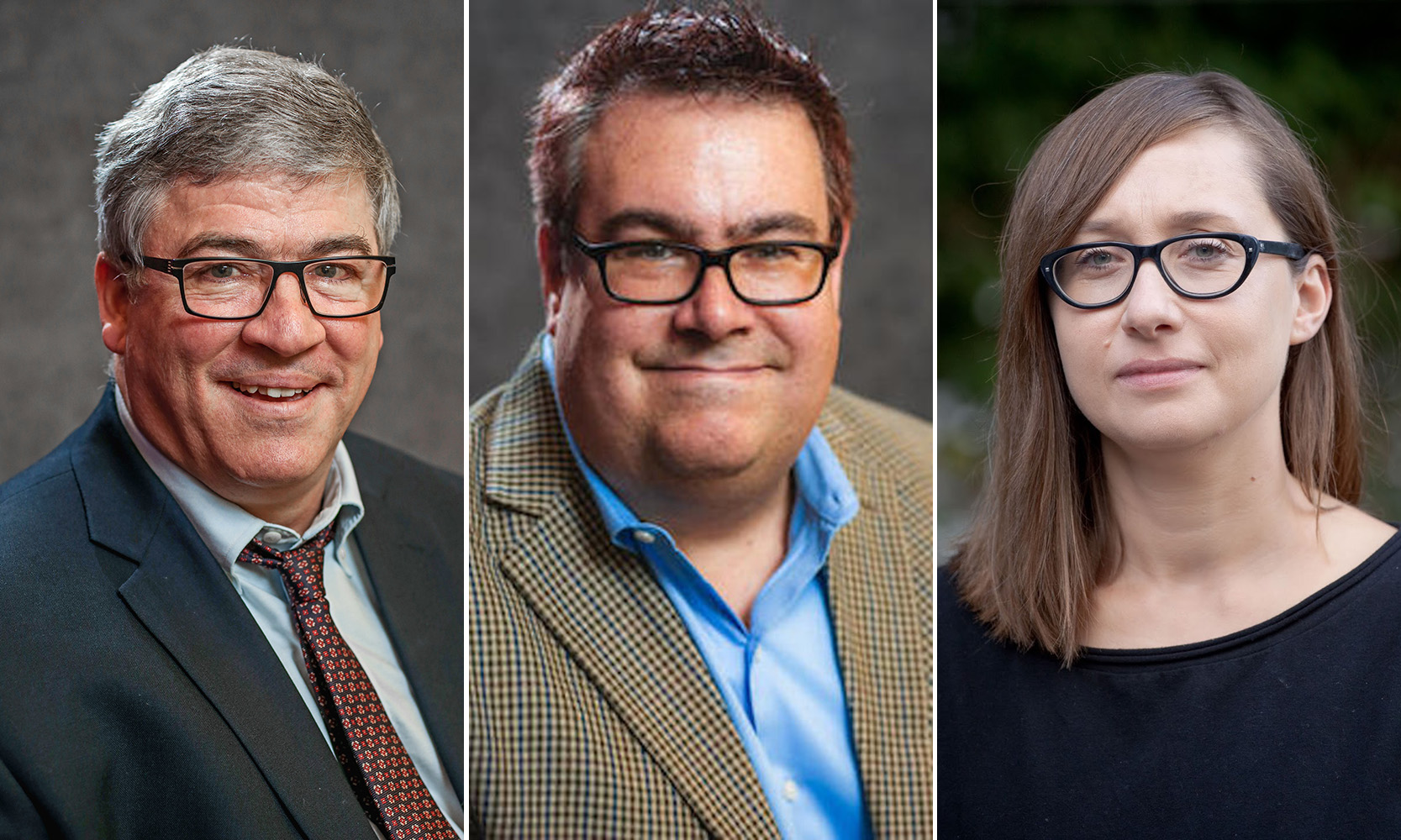Three College of Arts, Sciences, and Letters faculty will teach and conduct research in three different areas of the world — Southeast Asia, the Middle East and Europe — through a grant from the J. William Fulbright Foreign Scholarship Board.
Linguistics Professor Daniel Davis, Composition and Rhetoric Professor Bill DeGenaro and History Assistant Professor Anna Muller, who is also the Frank and Mary Padzieski Endowed Professor in Polish/Polish American/Eastern European Studies, each secured a 2019-2020 Fulbright U.S. Scholar grant to take part in research that focuses on developing international understanding and building long-standing cross-cultural relationships. The Fulbright Program is an international educational exchange sponsored by the U.S. government.
CASL Dean Marty Hershock congratulates his faculty colleagues and said the multiple awards show the caliber of talent in the college
“These are incredibly competitive and prestigious awards and to have three faculty named as Fulbright recipients in a single cycle is extraordinary,” Hershock said. “Our students are taught by faculty members who are not just part of the conversation. On the contrary, their work is a topic of conversation around the globe.”
To learn more about Fulbright Award grants and UM-Dearborn Fulbright experiences, a panel discussion with a question-and-answer session will take place March 20 at 3:30 p.m. in CASL 1030. German Professor Jackie Vansant, who has received multiple Fulbright U.S. Scholar grants, will moderate.
DeGenaro and Muller will take part in the panel and share their previous Fulbright involvement — DeGenaro traveled to Lebanon in 2010 and Muller to Poland/Ukraine in 2007 — and their upcoming projects.
Here’s what the recently awarded faculty members plan to accomplish through the Fulbright Program in the coming year.
Professor Daniel Davis, Philippines
To students in his World Englishes course, Davis teaches how the English language is used differently around the world. His Fulbright research will dive deeper into this.
Partnering with Ateneo de Manila University in Manila, Davis will study how people in the Philippines use English — specifically looking at the language’s influence in culture and the culture’s influence on the language. He said that Ateneo de Manila University, for which he’ll also develop and teach a World Englishes course, has an extensive library collection about the history of American involvement in the Philippines to aid him in his understanding.
He said the 2018 International Association for World Englishes Conference in Manila brought his attention to the influence English has in the southeastern Asian country.
“They call it Philippine English. This type of reinvention happens in many multilingual societies — we have this in Dearborn too — when we pick and choose words from our main languages and use them in a combined way that works for us and essentially creates something new,” he said.
He said understanding language evolution helps him in his educational mission. “A student’s linguistic repertoire helps you better understand the motivation of the person you are trying to teach. To best reach them, you need to know where they are coming from.”
Professor Bill DeGenaro, Jordan
At Al-Zaytoonah University, and additional institutions in Jordan, DeGenaro plans to develop faculty workshops and higher-education curriculum on teaching writing to multilingual learners. Most English courses in the Middle East region are focused on TESOL, applied linguistics, translation studies and literature, but not the art of writing.
While DeGenaro introduces a different side of English language studies, he’ll also learn from his Middle Eastern peers and students; he said this chance to build reciprocal cultural understanding is what he’s most looking forward to.
“Good writing is perhaps the most important skill for success in the information-saturated 21st century. I welcome the chance to let students, faculty and community members [in Jordan] share with me their language, culture and homeland while I share what I know about writing pedagogy.”
Assistant Professor Anna Muller, Poland
Combining ethnographic fieldwork, oral history interviews and archival research, Muller will travel throughout Poland to write a history of the region and the impacts of changes — both in place and mindset — on northwestern Polish villages in the second half of the 20th century.
Muller said the “regained territories” of this region — following World War II, Polish people moved to these vacated lands once occupied by Germany — constituted an important element in the policies of the new Polish socialist state that aimed at forming a new political, cultural and social consciousness. Her project goal is to write a book.
Muller said the central questions of the project revolves around three main issues: The farmers’ evolving worldviews and ethics from building socialism to the transformation to capitalism; the dialogue between an identity and space, and a changing role of material conditions, nature, even farm animals in the farms.
“I believe that a thick ethnographic description of the life of the people in these territories takes into account time changes, social relationships, and also the land and the environment,” Muller said. “This can widen our understanding of various factors that determine one’s sense of belonging, and in doing so, enrich our understanding of various layers of identification.”




